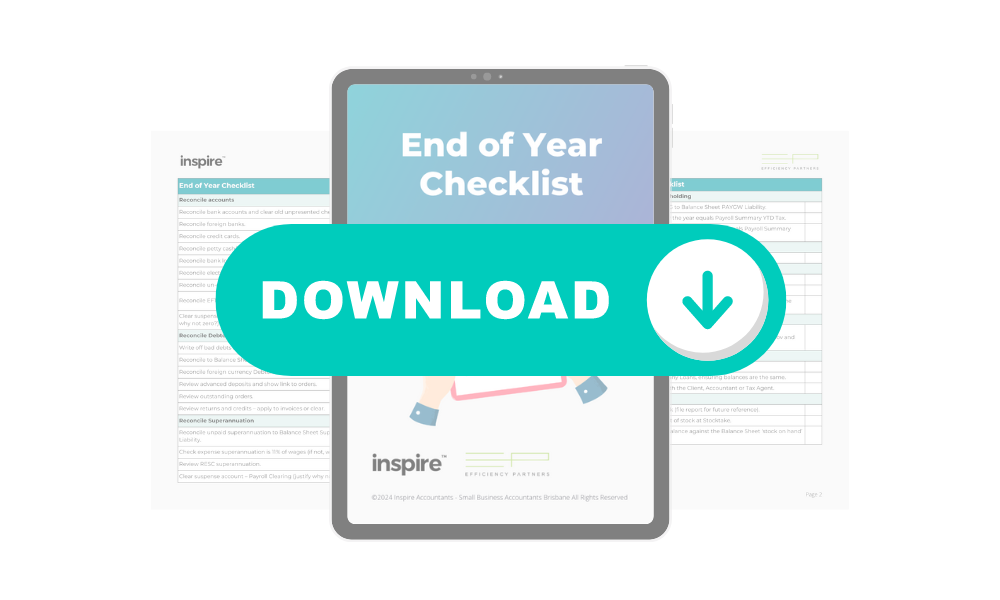Payroll for 2025FY
The tax rate cuts for the 2025 financial year will mean an increase in net payments to your employees. Last financial year, you would have withheld more tax compared to 2025FY to be remitted to the ATO when your BAS is due.
So, please ensure you have enough funds to pay employees’ net wages when processing your pay runs.
If you have set up recurring payments with your bank, ensure you update the recurring payments to reflect the new changes.
And last but not least, from 1 July 2024, the super guarantee has increased from 11% to 11.5%.
Your accounting software used for payroll should factor in tax and super changes. However, you will need to update your budget and cash flow to ensure you have enough funds at the right time to meet payroll obligations.

If you’re keen to explore changing accountants, we have a non-obligation process to do that. The first step is booking a strategy call with one of our accounting team. It’s a free 20-minute zoom or phone call where you get to meet us to manage your questions.
From that point, you can consider doing a “Look Under The Hood” with us. There is no obligation to change accountants, but we give you a second opinion if you’re paying too much tax.
Throughout that process, we can identify any problems we see with your current setup. Anything that your current accountant hasn’t claimed, or tax you may have overpaid, and strategies of how we might fix that going forward. We can run through with you once you book with us.
The Early Bird Catches the Worm
While the 2024 financial year has come to a close, it’s time to get your books ready for your accountant to prepare financials and tax returns.
If you have a bookkeeper, they will hopefully assist in finalising your payroll and getting a work pack ready for your accountant to start preparing your financials and tax returns.
Don’t have a bookkeeper? Please download our comprehensive checklist to assist you in getting your books ready.

The more organised you are, the faster your accountant will be able to finalise preparing your financial statements and returns.
For family groups that lodged their 2023FY late, you will need to get started early since you will not be eligible for an extension, and your 2024FY returns will be due for lodgement by 31 October 2024.
If you’re keen to explore changing accountants, we have a non-obligation process to do that. The first step is booking a strategy call with one of our accounting team. It’s a free 20-minute zoom or phone call where you get to meet us to manage your questions.
From that point, you can consider doing a “Look Under The Hood” with us. There is no obligation to change accountants, but we give you a second opinion if you’re paying too much tax.
Throughout that process, we can identify any problems we see with your current setup. Anything that your current accountant hasn’t claimed, or tax you may have overpaid, and strategies of how we might fix that going forward. We can run through with you once you book with us.
$20K Instant Asset Write-off bill has become law
The much-awaited bill has now received royal assent on on 28 June 2024. Small businesses with an aggregated turnover of under $10 million will be able to write off assets purchased between 1 July 2023 and 30 June 2024 that cost $20K and under.
What does that mean for businesses that purchased assets costing more than $20K?
If your small business has an aggregate turnover of less than $10 million, you can access the small business pool depreciation rules, which provide an accelerated depreciation rate of 15% in the first year, followed by 30% each year thereafter.
Once the balance of the pool in a given year falls below the instant asset write-off threshold for that year (before applying the depreciation deductions), you will be able to write off the balance.

If you’re keen to explore changing accountants, we have a non-obligation process to do that. The first step is booking a strategy call with one of our accounting team. It’s a free 20-minute zoom or phone call where you get to meet us to manage your questions.
From that point, you can consider doing a “Look Under The Hood” with us. There is no obligation to change accountants, but we give you a second opinion if you’re paying too much tax.
Throughout that process, we can identify any problems we see with your current setup. Anything that your current accountant hasn’t claimed, or tax you may have overpaid, and strategies of how we might fix that going forward. We can run through with you once you book with us.
Parental Leave Gets a Boost for New Parents (Starting 1 July 2025)
Great news for expectant parents!
The federal government will be paying a 12% super parental leave payment if you meet the following criteria:
- have children born or adopted on or after 1 July 2025
- are eligible for Australian Government Paid Parental Leave
If you’re keen to explore changing accountants, we have a non-obligation process to do that. The first step is booking a strategy call with one of our accounting team. It’s a free 20-minute zoom or phone call where you get to meet us to manage your questions.
From that point, you can consider doing a “Look Under The Hood” with us. There is no obligation to change accountants, but we give you a second opinion if you’re paying too much tax.
Throughout that process, we can identify any problems we see with your current setup. Anything that your current accountant hasn’t claimed, or tax you may have overpaid, and strategies of how we might fix that going forward. We can run through with you once you book with us.
Do you have an upcoming business trip? Here’s a tax outlook to make it easier
Travelling for business can involve various expenses, and understanding how taxes apply can be confusing. The below key points clarify how travel expenses are treated for tax purposes, clarify deductibility for business owners and highlight any requirements.
Key Points:
- Business Travel:
- All travel expenses, including meals with or without alcohol, are deductible for both you and your employees when travelling overnight for business.
- It’s essential to keep a travel diary for documentation purposes.
- Private Travel:
- Paying for private travel for your employees or their associates is considered a Fringe Benefit, subject to FBT.
- Non-deductible expense: Any private travel paid for non-employees falls under this category.
- Combined Business and Leisure Trips:
- If a trip has both business and leisure components, you need to apportion the costs.
- Only the expenses that would have been incurred solely for business are deductible.
- Any costs related to the leisure portion are either Fringe Benefits (for employees) or non-deductible expenses (for non-employees).
For travel to be considered “business”, it must be undertaken to:
- Generate income for your business.
- Fulfil a contractual obligation related to your business.
- Attend a conference or meeting relevant to your business.
- Maintain or improve your skills relevant to your business.
Bear in mind that this is a general overview guide. For specific guidance regarding your circumstances, we recommend reaching out to your dedicated accountant.
If you’re keen to explore changing accountants, we have a non-obligation process to do that. The first step is booking a strategy call with one of our accounting team. It’s a free 20-minute zoom or phone call where you get to meet us to manage your questions.
From that point, you can consider doing a “Look Under The Hood” with us. There is no obligation to change accountants, but we give you a second opinion if you’re paying too much tax.
Throughout that process, we can identify any problems we see with your current setup. Anything that your current accountant hasn’t claimed, or tax you may have overpaid, and strategies of how we might fix that going forward. We can run through with you once you book with us.
Confused about whether you need to pay superannuation for your contractors?
Businesses engage contractors for specialised skills or to streamline costs. But keep in mind, that superannuation isn’t always off the table.
You generally don’t pay super for independent contractors. But, if the contract is wholly or principally for their labour, you might be liable. This applies even if they have an ABN, regardless of their earnings amount.
So, a seemingly genuine “contractor” might be classified as an “employee” under the Super Guarantee Act.

Here are the key factors that could trigger super on contractor payments:
- The individual is paid for their labour and skills
- The individual can't subcontract the work to someone else
- The individual is not paid to achieve a result or outcome
Tip: If the individual (i.e. independent contractor) is performing work for you through an entity such as a company or trust, they would not be considered an employee under the Super Guarantee Act.
If you’re keen to explore changing accountants, we have a non-obligation process to do that. The first step is booking a strategy call with one of our accounting team. It’s a free 20-minute zoom or phone call where you get to meet us to manage your questions.
From that point, you can consider doing a “Look Under The Hood” with us. There is no obligation to change accountants, but we give you a second opinion if you’re paying too much tax.
Throughout that process, we can identify any problems we see with your current setup. Anything that your current accountant hasn’t claimed, or tax you may have overpaid, and strategies of how we might fix that going forward. We can run through with you once you book with us.
Boost your Nest Egg: Super contribution caps are increasing from 1 July 2024
Good news for people who want to contribute more into their super.
Here’s a quick breakdown of the changes taking place from 1 July 2024:
- Concessional contributions (CC) cap: This increases from $27,500 to $30,000 per year. This includes employer contributions and salary sacrifice contributions.
- Non-concessional contributions (NCC) cap: This increases from $110,000 to $120,000 per year. This allows you to contribute your own after-tax dollars to your super.
Maximum NCC cap under bring-forward rules: This increases from $330,000 to $360,000. This allows you to make larger contributions under specific eligibility

If you’re keen to explore changing accountants, we have a non-obligation process to do that. The first step is booking a strategy call with one of our accounting team. It’s a free 20-minute zoom or phone call where you get to meet us to manage your questions.
From that point, you can consider doing a “Look Under The Hood” with us. There is no obligation to change accountants, but we give you a second opinion if you’re paying too much tax.
Throughout that process, we can identify any problems we see with your current setup. Anything that your current accountant hasn’t claimed, or tax you may have overpaid, and strategies of how we might fix that going forward. We can run through with you once you book with us.
The Crucial Timing Aspect Of Restructures
Timing is important, not just from an eligibility perspective, but also in terms of effort. We wouldn’t move houses if we were expecting a baby in the coming week, just as you wouldn’t move your business if you are about to go for one of your biggest tenders. So, it’s about choosing your battles wisely. If you’re considering it, you’ll want to think about it as early as possible and choose a suitable time as well.
From a tax perspective, we typically discuss wrapping up your prior business at the end of a tax period. Financially, it’s great, but sometimes it’s not ideal. At least at the end of a BAS period, too. That way, you’re not dealing with two BASs simultaneously. These small adjustments make things a bit easier and ensure a clean break.

If you’re keen to explore changing accountants, we have a non-obligation process to do that. The first step is booking a strategy call with one of our accounting team. It’s a free 20-minute zoom or phone call where you get to meet us to manage your questions.
From that point, you can consider doing a “Look Under The Hood” with us. There is no obligation to change accountants, but we give you a second opinion if you’re paying too much tax.
Throughout that process, we can identify any problems we see with your current setup. Anything that your current accountant hasn’t claimed, or tax you may have overpaid, and strategies of how we might fix that going forward. We can run through with you once you book with us.
Restructuring Discretionary Trusts: Key Facts

A discretionary trust does not allow for a fixed interest or a fixed percentage ownership within the trust itself. They are very common, especially within family groups running a business; this structure is quite normal from that perspective.
So, when there is a need for more than one family group to own that entity, we may need to consider one of two options. One option is a unit trust, where a fixed ownership percentage can be established. The other option is a company, where shares can be allocated to each family, or if there are multiple investors, or companies can have fixed entitlements in shareholding.
This is a fundamental requirement when considering an external investor and a very common reason for wanting to restructure.
If you’re keen to explore changing accountants, we have a non-obligation process to do that. The first step is booking a strategy call with one of our accounting team. It’s a free 20-minute zoom or phone call where you get to meet us to manage your questions.
From that point, you can consider doing a “Look Under The Hood” with us. There is no obligation to change accountants, but we give you a second opinion if you’re paying too much tax.
Throughout that process, we can identify any problems we see with your current setup. Anything that your current accountant hasn’t claimed, or tax you may have overpaid, and strategies of how we might fix that going forward. We can run through with you once you book with us.
Has your business been impacted by the South Queensland Severe Storms and Rainfall?

The Queensland Government has made Extraordinary Disaster Assistance Recovery Grants available to assist directly impacted primary producers, small businesses, and non-profit organisations with the costs of cleanup and reinstatement.
Depending on your business type, the maximum grant available ranges from $50,000 to $70,000.
To be eligible, your property must be located in one of the following defined disaster areas:
City of Gold Coast Council
Logan City Council
Scenic Rim Regional Council
Click this link to find out if you’re eligible and to apply.
Additionally, Disaster Assistance Loans are available if the grants are not enough. Please visit this link for details and how to apply.
If you’re keen to explore changing accountants, we have a non-obligation process to do that. The first step is booking a strategy call with one of our accounting team. It’s a free 20-minute zoom or phone call where you get to meet us to manage your questions.
From that point, you can consider doing a “Look Under The Hood” with us. There is no obligation to change accountants, but we give you a second opinion if you’re paying too much tax.
Throughout that process, we can identify any problems we see with your current setup. Anything that your current accountant hasn’t claimed, or tax you may have overpaid, and strategies of how we might fix that going forward. We can run through with you once you book with us.
Get Cashed Up



